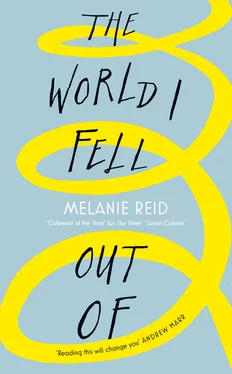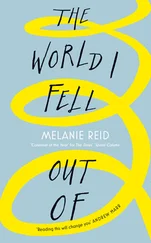Because my neck was unstable, they needed to secure the vertebrae at the front with a small metal plate. Before the operation, there were chats, which I only very vaguely remember, with both the anaesthetist and the neurosurgeon. The operation was tricky because my neck had swollen so much that from the ears down my neck flared out towards my shoulders, like some monstrous steroid-happy body-builder. It looked so grotesque Dave did not allow Dougie to visit me for several days.
‘You made an international prop forward look swan-necked.’
So swollen was my throat that the act of intubating me for the anaesthetic was risky and the operation, to plate the front of my sixth cervical vertebrae, took several hours. Afterwards they were worried that my throat would close up with the additional trauma, so they kept me on a ventilator to breathe for me, a big fat air tube in through my mouth and down into my lungs, and I was even more sedated. I couldn’t speak. A drip fed my body with fluid; a catheter drained it out. Of all this I was oblivious. I also had a nasal-gastric tube up my nose and down my throat, through which they passed the ground-up drugs into my stomach. When I was with-it enough to cry, the tears ran into my ears and soaked the tape securing the feeding tube to my face. I could do nothing about this; it was the same exquisite misery as when you have a streaming cold but are unable to blow your nose. The only thing to do was try not to cry. Christine had told me things would get better and she never let me down – I just had to take shelter in my head and hang on.
To enable me to communicate while on the ventilator, the nurses hung a laminated card with an alphabet by my right arm. After my fall, Pam, a dear friend of many years, rushed from France to support Dave. I have snatches of memory of them both at my bedside, with me conducting irritable, faltering mime conversations with them, spelling out the words by waving my right forefinger at the letters. My mind – I was convinced – was as clear as a bell; I became increasingly exasperated when they failed to keep up with my slow-motion spelling and grasp the words. They can’t be this stupid, I thought crossly. One day they arrived and said happy birthday – I remember feeling a genuine sense of shock and surprise. My birthday was 13 April, surely not yet. But I had lost control of time; I’d been on a ventilator for more than a week and the sound of its rhythm, sucking and sighing, the persistent beep-beep-debeepbeep behind my head, had become the vortex of my entire life. My real world was inside the apricot. I waited, while the scene changes came thick and fast and the only constant was the machine, sighing and pinging apologetically.
Some nights, my bed was in the corner of a room that was being used for a party. They’d opened an Indian restaurant on the ward. There were vast buffets of curry spread out, people came and went, laughing. My bed kept being moved. Every day I was in a different room and strived to orientate myself. One night I had a bird’s-eye view overlooking a city, which lay across the curve of a bay. In the dark the lights of the city were twinkling, reflecting across the water. Another night, workmen, wearing high-vis jackets, were digging up the floor around me. Then my bed split in two across the middle and I was sliding down into the gap, suspended over dark, deep water, and I kept crying out to the nurses to tell them I was going to drown, but they didn’t understand. One nurse was lying on the floor behind my bed snogging a workman. Another night, I was kidnapped – strangers used a fork-lift truck to take me, on my bed, out the back of the ward and stow me in a horsebox. They wanted me to go back to the cross-country course and testify that my accident was not their fault.
A family game from childhood haunted me, the rhyme shimmying around in my head. It had come from my mother, who played it in Northern Ireland in the 1920s on the way to picnics on the beach, sometimes Tyrella, sometimes Ballywalter. We played it too, obediently, on the back seat of the car. You crossed two fingers from one hand, opened a little, over the two fingers on the other hand, creating a neat, square, inviting hole in the middle. As you offered the gap to the person next to you, you chanted:
Put your finger in the crow’s nest
The crow’s not at home
He’s gone to Ballywalter to gather shelly stones …
And then, squeezing on the other person’s finger, you shouted:
He’s coming
He’s coming
He’s nipping!
He’s nipping!
And you squeezed and squeezed, and held them, trapped tight by the finger, until they squealed for mercy.
At one of the ward rounds, in a window of comparative sanity, I remember meeting my consultant for the first time. Mariel Purcell was young, a tall cool stylish Irishwoman, with long dark hair she wore loose. She wore sassy dresses and high heels. ‘We are keeping you on the ventilator,’ she told me. ‘You have a lung infection and we are giving you antibiotics.’ Later, when I was off the ventilator, she was more expansive. It was pneumonia. I was strangely thrilled, in the way you are when you’re a kid and you’re going to have something to boast about when you go back to school. It was like being eight again, falling off roller skates and cracking a bone in your wrist. But at that point I was just frustrated. I’m fine, I tried to tell her with my eyes. The purgatory of the ventilator jammed in my mouth was becoming unbearable. I wanted it taken out. I pleaded with the nurses on my alphabet card. W-H-E-N? T-O-D-A-Y? At the weekend, they said. Soon. They lied. Lied repeatedly and prodigiously. The weekend never came. Day followed day. I inhabited some lost bit of space, some cul-de-sac on the dark side, all alone, floating along in my own ghastly spaceship of tubes and sighs. Beep-beep-debeepbeep. Beep-beep-debeepbeep.
I remember when they took the ventilator out – there was an unpleasant rippling sensation as the corrugated ridges of the tube were withdrawn from my throat, I had a fleeting vision of those perforated blue drainage pipes, the kind you dig into the soil of your garden. Then it was over and I was drawing in my own air, could talk again. My jaw and my ears ached, despite the morphine, my tongue so dry and fat I was barely decipherable. I pleaded for a drink, but they refused: it was still too dangerous for me to try swallowing. At one point Christine moved across my line of vision, dragging a machine on wheels.
‘You don’t know this, but today is a very good day, a very significant day for you.’
I looked quizzical.
She smiled her shy smile. ‘I’m taking the ventilator away from your bed space. You’re making real progress.’
At some point during that time, on a morning ward round, the doctors clustered inside the curtains round my bed and asked to do an anal examination. What I didn’t know was that this was the test to see how paralysed I was. The spinal cord ends in the perineal area, your bottom, and if you have sensation in your anus, it indicates how badly injured your spine is.
I was rolled on my side and they stood behind me. Can you feel that? Can you clench your bottom? No, I said. Nothing. They were silent, grave. I decided, in my morphine haze, to be a good hostess and fill the silence to cover up any embarrassment. After all, my body was the party, wasn’t it? ‘That’s the nicest anal examination I’ve ever had,’ I said in a jolly more-tea-vicar sort of voice, trying to lighten the atmosphere, turning my head so I could grin at them. I didn’t understand why they didn’t smile back.
The severity of a spinal injury is measured on a scale developed by the American Spinal Injury Association – the ASIA impairment scale. If you are Asia A, you’re completely buggered, basically: you have no power or sensation preserved below the injury to your spine. You will not recover function. Asia B, you have sensory feeling below the injury but your muscles don’t work. Asia C, some muscles do work but they’re very weak. Asia Ds have muscles, at least half of which have reasonable strength and they can walk. And Asia Es, lucky creatures, are normal healthy people.
Читать дальше












